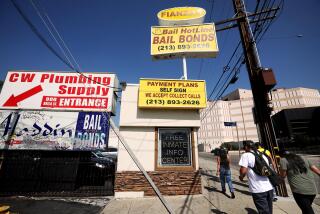Parents Ordered to Pay for Children’s Jail Costs : Justice: South Carolina prosecutor’s policy angers some critics, who call it unfair to the poor and to blacks.
- Share via
COLUMBIA, S.C. — Making parents chip in for their delinquent children’s jail costs angers many who say it’s an unfair double-whammy for the working poor.
Supporters say parental responsibility doesn’t end at home.
Since February, the local prosecutor has been asking judges to order the payments, based on a family’s income. Some who have been hit with the charges call the program unfair.
“If I’m working, and I’m a taxpayer, I shouldn’t have to pay twice,” said Karen Wigfall, who was ordered to pay $34 a week while her 15-year-old son awaited trial on drug and weapons charges.
But the initiative has its supporters as well.
Catherine Brooks, who turned in the 14-year-old grandson she’s rearing for stealing her Christmas money, paid $100 during the month he was jailed.
“While he’s paying, I’ll be paying. So we’ll both remember,” she said. “I don’t think we should rely on taxpayers to feed our children.”
Solicitor Dick Harpootlian, whose two-county district includes the state capital, defended the principle behind his effort.
“If you’re looking at (juvenile justice) as treatment, why shouldn’t the parent participate in that?” he said. “Too many people were looking at it as punishment when it’s not. It’s support.”
Under pressure from critics, Harpootlian has stopped asking for money from parents of children awaiting trial, but will seek retroactive payments if the child is convicted.
The local chapter of the National Assn. for the Advancement of Colored People said Harpootlian “effectively declared war” on blacks because many children held are poor and black.
“This . . . will, in effect, do more to destroy the family than it will to help,” chapter president Adell Adams said.
But two black legislators have sponsored a bill to make Harpootlian’s tactic part of state law.
Others say it discriminates against women who are more likely to head single-parent households and have children in trouble.
“No one’s saying that parents ought not be responsible,” said Kevin Gray, American Civil Liberties Union state chapter president. “It’s that the state ought not be in the business of determining what’s responsible.”
Similar attempts to make parents pay were found unconstitutional in California, said David Lambert, a lawyer at the National Center for Youth Law in San Francisco. The courts said detention is a public function, but left open the possibility that parents could be charged for such things as their children’s food, he said.
Out of about 20 parents Harpootlian took to Family Court in the first month, five or six were told to pay, he said. Most of the rest were too poor.
Harpootlian said the payments cover only a fraction of the $30 to $100 per day that counties and the state spend on juvenile confinement.
Family Court Judge Robert Burnside, who has issued some of the payment orders, said adults may need to feel the bite to remind them of their responsibilities.
“Some of these parents, you could send the kids away and they could care less,” Burnside said.
More to Read
Sign up for Essential California
The most important California stories and recommendations in your inbox every morning.
You may occasionally receive promotional content from the Los Angeles Times.









